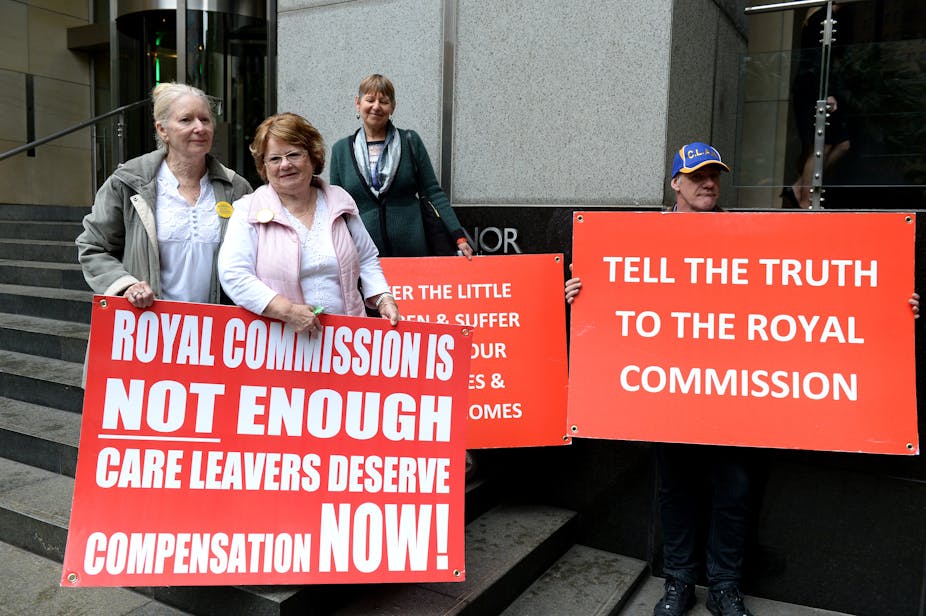“You have the records of our abuse.” So read the placards held by protesters outside hearings of the Royal Commission and the recent Victorian parliamentary inquiry into child sex abuse.
These protesters are people who experienced institutional “care” as children. They are a group for whom access to records is a vital issue. For these people, records are key to achieving justice for wrongs of the past.
What is perhaps less obvious is how crucial these records can be for care leavers’ identity and well-being.
The Victorian inquiry’s report, Betrayal of Trust, brought issues surrounding institutional recordkeeping into sharp focus. The inquiry heard of practices within the Catholic Archdiocese of Melbourne in the 1990s that left no documentary trace of allegations of abuse and the institution’s response.
Records as evidence
The Salvation Army conceded that files from its children’s homes had been lost or destroyed. They contended that this situation did not arise from a culture of cover-up, but from a lack of appreciation of the value that these files would have to care leavers in the future, or to inquiries.
Recent attention on the issue of records has largely focused on the value of documents as evidence: to support the inquiries of bodies like the Royal Commission, and to allow survivors of child abuse to pursue cases in the criminal justice system.

Documentation is crucial to the successful prosecution of perpetrators, and many cases have failed to go to court because of the unavailability of evidence. For many care leavers, pursuing justice is about the successful prosecution of offenders. The inquisitorial work of the Royal Commission will play a vital role in understanding this dark history and preventing the future abuse of children.
But it’s important to realise that access to records is a vital issue for people who grew up in care, for all sorts of other reasons. These records are integral to justice and redress, which is about more than punishing offenders.
Records are of practical importance. To access federal and state-funded services, Forgotten Australians are sometimes required to provide confirmation of time in care (or COTIC). And everyone needs basic identity documents to do things such as travelling overseas or getting a driver’s licence.
For people who grew up in care, these can be expensive, complex and daunting processes.

This is not just a historical problem. There are young people currently in out-of-home care for whom birth certificates cannot be found.
The special circumstances of this group of people are not widely understood by staff in births, deaths and marriages agencies or by the wider community, which compounds the problem.
One former resident of Ballarat Orphanage, Frank Golding, has explained why many people who grew up in care do not have this information about who they are:
Nobody took the time to talk to us about our family backgrounds and, in some cases, when we were told anything, it was a pack of lies … Many of us never knew what we were doing in an orphanage until the best years of our adult years had passed – and then discovered that records had been kept.
Access to identity
Care leavers are hugely reliant on these records to piece together their sense of identity and come to terms with their past. But they face many barriers in accessing these records.
Apart from the problems created by poor recordkeeping practices, the laws governing the management of information are inconsistent, confusing and unsuited to the needs of care leavers.
Earlier this year, the Care Leavers Australia Network (CLAN) expressed anger at the access procedures that were required before a woman aged 90 could see a copy of her records.
Strict interpretations of records laws are disadvantaging care leavers, particularly when it comes to information about third parties. This information is removed from files released to care leavers. Family names are blanked out and sometimes copies of childhood photographs have the faces of everyone but the applicant blurred beyond recognition.

This reveals a limited understanding of identity and worth. Surely, we are who we are because of our relationships with other people. A person cannot hope to understand their childhood without these relationships.
Clearly, we need to strike the right balance between protecting the privacy of individuals and enabling care leavers to get information about their lives. We need to deliver an innovative approach for survivors of institutional care that is not constrained by existing laws.
Law reform is one possible solution, but so much more could be achieved, much sooner, if we change the way these laws are being interpreted and applied for care leavers. Another option is to sidestep the laws altogether and develop a new instrument to aid access to these records.
This is not a new idea. The Bringing them home report into the Stolen Generations of Indigenous Australians called for government and non-government record-holding organisations to adopt “common access guidelines”. This is necessary to ensure that individuals get consistent, timely, supported access to vital information about themselves, their family and community.
Subsequent Senate reports into child migrants and the Forgotten Australians made the same recommendation as another way to balance the act of recognising care leavers’ right to information while protecting the privacy of third parties.
For a real shift to occur, we need national leadership and for churches, charities and state governments to commit to this as a social justice issue and an extension of duty of care.
Giving care leavers special access to their records might be one way to help them achieve not only justice, but also recognition and a firmer sense of belonging and community.

